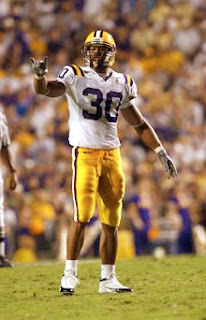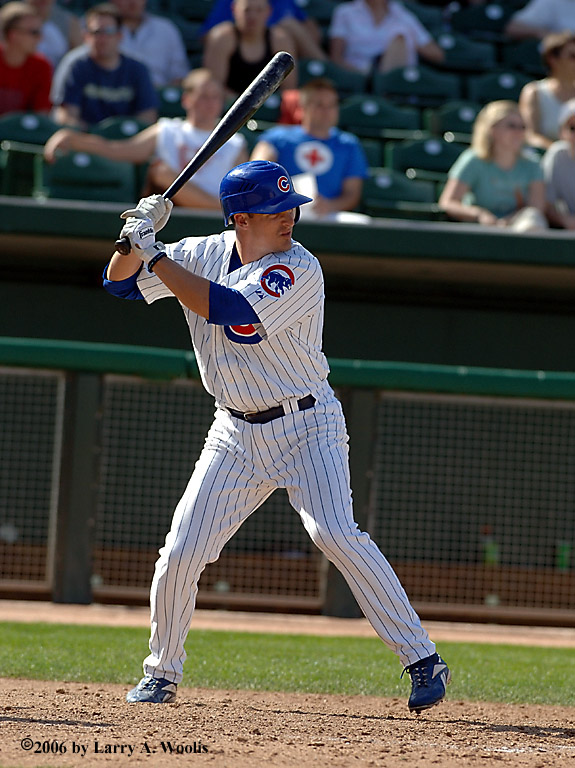 If you took a poll among NFL players today, you would probably be hard pressed to find one who wouldn't want to be thought of as "the franchise." Until free agency rolls around, that is, at which time what was once intended to be a flattering designation turns into a cause of discontent. If you are unfamiliar with the rules of the NFL, here is a quick breakdown of the franchise tag:
If you took a poll among NFL players today, you would probably be hard pressed to find one who wouldn't want to be thought of as "the franchise." Until free agency rolls around, that is, at which time what was once intended to be a flattering designation turns into a cause of discontent. If you are unfamiliar with the rules of the NFL, here is a quick breakdown of the franchise tag:• A club can designate one franchise player in any given year.
• The salary level offered by a player's old club determines what type of franchise player he is.
• An "exclusive" franchise player -- not free to sign with another club -- is offered a minimum of the average of the top five salaries at the player's position, or 120 percent of the player's previous year's salary, whichever is greater.
• If the player is offered a minimum of the average of the top five salaries of last season at his position, or 120 percent of the player’s previous year’s salary, he becomes a “non-exclusive” franchise player and can negotiate with other clubs. His old club can match a new club's offer, or receive two first-round draft choices if it decides not to match. The signing period for non-exclusive franchise players to sign with new clubs is March 3 through November 9 (10th week of the season).
To understand how the NFL's franchise tag has evolved into a potentially abusive tool, allowing owners and general managers to hold their star players hostage, it's important to look at its history.
Wilber Marshall was the first player ever slapped with the franchise tag. Marshall’s challenge to football’s newborn free agency system threatened an agreement which was supposed to usher in an era of labor peace and end a decade of work stoppages and lawsuits.
In 1992, free agency did not yet exist in the NFL. Major League Baseball players won the legal right to test the market once their existing contracts expired in the mid-1970s, but the NFL Players Association (NFLPA) was unsuccessful in doing so. In 1974, after a preseason lockout, NFL owners devised a plan that forced teams to pay compensation if they signed a free agent from another franchise. The price, however, was steep — a first-round draft choice — thus, few free agents changed teams. The fight to change the system during the strike in 1982 proved to be futile and produced no results.
After the 1987 strike, the Players Association changed its approach and allowed players to challenge the league’s free agency system in court. The owners panicked and quickly moved to "Plan B free agency" which said teams were allowed to retain the rights for 37 players on each roster, leaving the rest to become free agents. This failed to satisfy the players, many of whom successfully challenged the system in court. Few star players changed teams under Plan B. Ironically, one of them was Wilber Marshall, who was lured away from the Bears by the Redskins with a five-year, $6-million deal in 1988.
By the end of the 1992 season, both players and owners knew that change was inevitable. The league had been operating without a collective bargaining agreement for five years. Players were winning major court battles, and Reggie White's case vs. the NFL threatened the league’s entire salary system.
On January 6th, 1993, the Players Association and team owners agreed to a collective bargaining agreement and free agency officially became part of the NFL. Nevertheless, for the players, it came with two catches: a salary cap, which would take effect in 1994, and a new set of "designations", the most notorious being the franchise tag, that would limit the bargaining power of many top free agents in the league. If a player was "franchised" his team could offer him a one-year contract and take the player off the market. Owners in the NFL did not want the salaries of the top players in the league to escalate to the same levels as that of Major League Baseball. Although, not completely satisfied, one "right-of-refusal" player per team was much better than 37 per team, so players accepted the compromise. A few weeks after the CBA was ratified, teams found themselves with a new dilemma: to tag or not to tag. Facing a strict February 28th deadline to designate franchise players, owners and GMs hustled to comprehend and apply the new rules.
On February 23rd, the Redskins officially tagged Marshall, a 31-year-old linebacker coming off a 138-tackle, six-sack, Pro Bowl season. Later that same year the 49ers tagged Steve Young, the Buccaneers tagged tackle Paul Gruber and the Chiefs tagged defensive end Neil Smith. On March 2nd, Marshall became the first player to fight the franchise tag when he filed a memorandum in federal court asking judge David Doty, the same judge who on February 26th gave preliminary approval to the CBA, to remove the designation.
“We think this is not a fair or a reasonable position into which Wilber should be forced,” agent Richard Bennett said.
A hearing date was set for April 16th. By then, all ten of the players who were franchised that year would file objections. Just days after it's inception, the franchise tag became the most despised guaranteed pay raise in all of sports.
Doty ruled in the favor of the NFL and on April 30, gave his final approval to the agreement, including the franchise tag. Doty called the CBA “fair, reasonable, and adequate.” He said the arguments of Marshall and the other franchised players were “extremely limited in scope” and suggested that overall market conditions favored them. In the mean time, Marshall was given permission by Washington to work out a contract with the Houston Oilers, where he would play under Buddy Ryan, his defensive coordinator on the 1985 Chicago Bears.
While the Oilers and Marshall were negotiating, the league and the NFLPA were re-wording the rules behind the franchise tag. The results were that now a team could sign away another team’s "non-exclusive" rights franchise player. The price, however, was two first-round draft picks. The "exclusive" rights franchise player would receive the average of the top five salaries at his position calculated at the end of the signing period, not the end of the previous season.
The franchise tag, of course, remains a big part of the NFL today, as does the hostility of the players who are designated as "the franchise." A tagged linebacker (Lance Briggs) will make more than $7 million next season. As much as that may seem to you and me, superstars who are slapped with the tag feel the same way Marshall did in 1993. Somewhere, another team is willing to offer more money, or a longer deal, or a larger signing bonus.
Over the last few months, big-name players like Lance Briggs, Asante Samuel (pictured above, failing in his attempt to cover Bernard Berrian), and Dwight Freeney have been franchised. As of now, Briggs ended his hold out, realizing he couldn't afford to pass up over $400,000 a week, and the Colts did the honorable thing and gave Freeney a $75 million extension. Samuel on the other hand, has yet to sign his name to the one-year, $7.79 million contract the Patriots have put on the table and is saying he will sit out until the 10th week of the season. By returning on week 10, he is guaranteed to recieve a pro-rated portion of the $7.79 million deal but if he sits out the entire year, he gets nothing and the Patriots could franchise him again next year.
A good compromise, as they say, is one that satisfies no one, but when you consider the alternatives such as sitting out and losing large sums of money, the franchise tag doesn’t seem so bad. Are owners and GMs abusing the power which the wording of the CBA has given to them? In some cases yes (Samuel), but many times these teams do right by their players (Dwight Freeney). For example from 2002-2004, the Seattle Seahawks franchised offensive lineman Walter Jones and paid him $17.3 million in tenders. In 2005 the team rewarded one of the league's best blockers with a 7-year $52.2 million deal.
"The tag, to me, was always kind of a compliment," Seahawks coach Mike Holmgren said. "Now, it's like we're putting them in prison."
Players may despise being franchised, but the tag is now ingrained into the NFL's CBA and since it appears that there is no one prepared to fill the role of Wilber Marshall and challenge the league, don't count on the franchise tag going anywhere anytime soon.
 If you took a poll among NFL players today, you would probably be hard pressed to find one who wouldn't want to be thought of as "the franchise." Until free agency rolls around, that is, at which time what was once intended to be a flattering designation turns into a cause of discontent. If you are unfamiliar with the rules of the NFL, here is a quick breakdown of the franchise tag:
If you took a poll among NFL players today, you would probably be hard pressed to find one who wouldn't want to be thought of as "the franchise." Until free agency rolls around, that is, at which time what was once intended to be a flattering designation turns into a cause of discontent. If you are unfamiliar with the rules of the NFL, here is a quick breakdown of the franchise tag:











